Are emerging-market stocks primed to take off? With the US Dollar weakening this year from historic strength, and China adjusting policy in attempt to stimulate the world’s second largest economy into spending, there are several positive signs for this sector.
In this guide, amongst exploring the sector at large, with some of the benefits and risks; we will look at four of the best emerging market stocks or ETFs that could benefit from an influx of FDI.
| Stock | Ticker | Description |
|---|---|---|
| Alibaba Group Holdings | BABA | Chinese eCommerce powerhouse. Highly sensitive to Chinese economic growth. |
| Tata Motors | TATA | Largest Indian automaker, riding a resurgent Indian economy and forward-looking export markets. |
| iShares MSCI Emerging Markets ETF | EEM | A broad basket of emerging market stocks centred on China and India. |
| iShares MSCI India Small-Cap | SMIN | An ETF focussed on the smaller but faster-growing Indian companies. |
Why Emerging Markets Stocks?
If played out, both of these themes will cause a lowering in the value of the US Dollar relative to a basket of foreign currencies and will likely boost the Chinese economy. That being said, US stocks have massively outperformed their counterparts over recent years. There is certainly a performance delta, and the P/E ratios found stateside would look out of place in emerging markets.
Emerging markets that carry a lot of US dollar-denominated debt that until now have been wilting under the weight of relatively higher US dollar-priced commodity imports of energy, grains, and metals will find relief in a weaker US dollar.
Furthermore, investment dollars will look to emerging markets for capital appreciation as yields decline on US dollar-denominated assets.
A stronger Chinese economy will reinvigorate the belt-and-road initiative, providing an added Chinese foreign-direct-investment (FDI) boost to its already improving balance sheet under a weaker US dollar.
Already the US Dollar is starting its long descent from the COVID-19 highs, as measured by the relative strength of the euro this year.
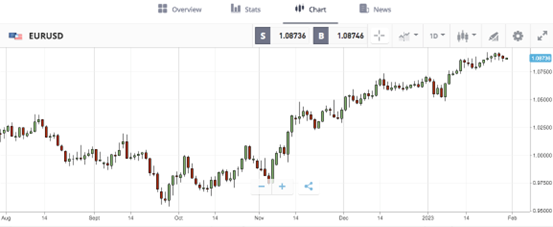
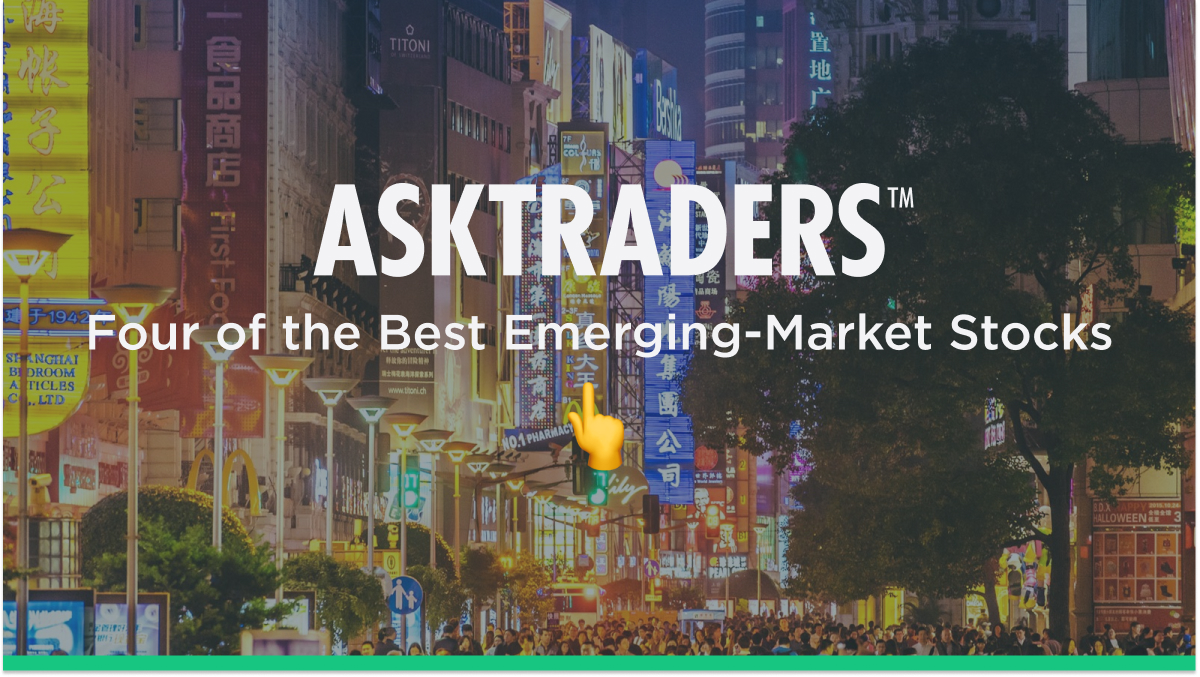
What are emerging market stocks?
An emerging market stock originates from a company in a country considered to be in the early stages of economic development. The countries are typically characterised by high growth potential, a large population, and a rapidly expanding middle class.
The term emerging markets typically refers to countries like China, India, Brazil, Russia, and South Africa, among others. These nations exhibit robust growth potential but also face challenges, including potential political instability (real or perceived), less mature financial systems, and fluctuating regulatory environments.
Because of this, investments in emerging markets carry a higher degree of risk, often tied to currency volatility, liquidity constraints, and economic shifts. Higher risk also comes with an accompanying potential of higher returns, if you manage to pick the right time, and the right opportunity.
Due to their high growth potential, emerging market stocks are often considered a worth exploring for investors looking to increase the return on a stagnant portfolio.
There are multiple ways to enter into an emerging market trade. These include but are not limited to the following:
- Direct Stock Purchase: this involves buying shares of a specific company directly through its stock exchange. This method is useful for investors wanting to target a particular company with a good understanding of the company’s fundamentals.
- Mutual Funds or ETFs: Mutual funds and ETFs allow investors to gain exposure to a diversified portfolio of emerging market stocks. These investment vehicles are managed by professional fund managers who select stocks based on fundamentals and market trends.
- ADRs: American Depository Receipts (ADRs) are a way for investors to buy shares in foreign companies listed on a US exchange. These securities are denominated in US dollars and traded like domestic stocks.
- Index Funds: Index funds track a specific market index, such as the MSCI Emerging Markets Index, which includes a basket of stocks from emerging market countries.
Alibaba Group Holding Ltd NYSE: BABA (BABA)
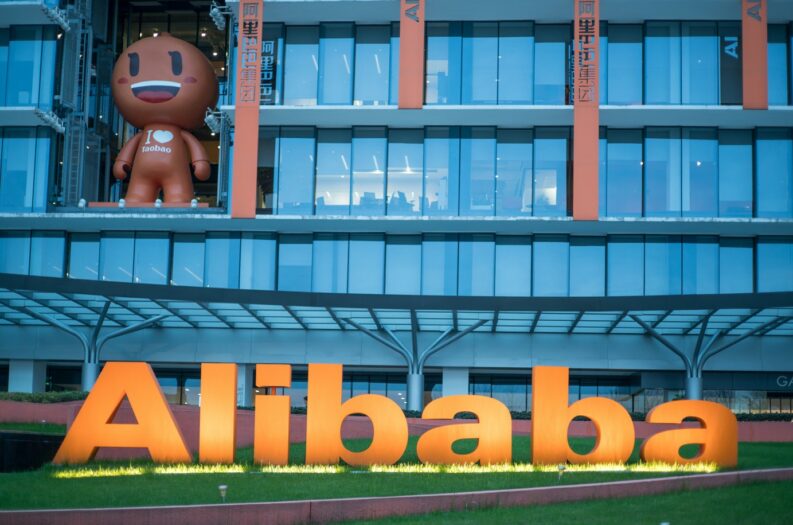
BABA’s stock suffered with equal measure under the weight of a reduction in eCommerce following the return to work and the high-interest rate environment of 2021 and 2022.
BABA is an expected beneficiary as the Federal Reserve looks for an off-ramp to the recent interest rate hikes and China returns to regular business.
The eCommerce giant is well positioned to profit from the surge in demand in China and the anticipated boost to the global economy due to an increase in worldwide travel and shoppers looking to increase spending.
When people can move more freely, they are more likely to go out and spend, whether it be in-store or online. This increased consumer activity can lead to an increase in sales for eCommerce companies as more people discover and purchase products through their platforms.
Additionally, with more people on the move, eCommerce companies may also see an increase in demand for delivery and logistics services, which can further drive revenue growth.
Baba’s stock has seen a resurgence in recent weeks, up over 35% since the start of the year. Investors are placing big bets on a rosier outlook for this eCommerce company.
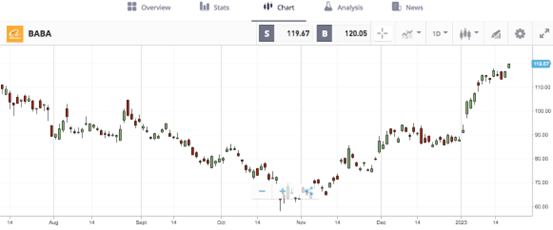
eToro is a multi-asset investment platform. The value of your investments may go up or down. Your capital is at risk.
Tata Motors Ltd NYSE:TTM (TTM)

Tata Motors has its headquarters in Mumbai, India, where the company was founded. Under President Narendra Modi, India has experienced an economic renaissance. After slowing down markedly in 2020, India’s GDP growth was 8.7% in 2021, outstripping that of its neighbour Pakistan by 2.2%.
A stable political environment and progressive market policies are leading Indian companies into a golden age of growth. The middle class in India has grown from a 14% share of the population in 2004 to 31% in 2022.
A ballooning middle class is positive for the automotive sector because that group has more disposable income to spend on consumer goods, such as cars.
As incomes increase, customers are more likely to buy new cars, upgrade to more expensive models or trade in their old vehicles. This consumer demand will increase sales and revenue for automotive companies and promote growth in related industries such as car financing, insurance, and aftermarket services.
Additionally, as incomes grow, consumers may also start to demand more advanced high-value vehicles, which could boost innovation and R&D spending in the automotive sector.
TTM’s share price is up by 8% to start the year, and the company is well positioned to benefit from an increase in market size thanks to India’s growing middle class. An increasing interest in its electric vehicle fleet is likely, as is more local and foreign investment as the momentum in the market grows.
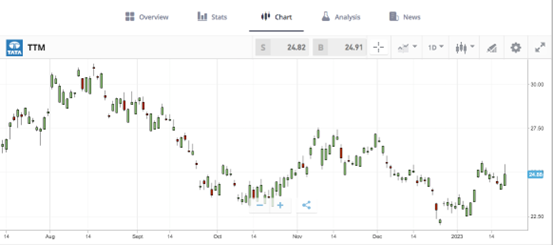
eToro is a multi-asset investment platform. The value of your investments may go up or down. Your capital is at risk.
iShares MSCI Emerging Markets ETF NYSE:EEM (EEM)
Emerging markets, on average, outperform developed economies and did so for the two decades before the pandemic. With reward comes risk and the downturns are more severe as investment quickly dries up and conditions sour.
As we close the book on the pandemic era, emerging markets are rising and are projected to outperform developed economies. The Economist projects that emerging economies in Asia are set to grow 2-3% per year, while growth in the US and Europe will only average 1-2%.
For the long-term investor, an excellent way to capture the increase in growth while creating a diverse portfolio less susceptible to the inevitable stumbles and pitfalls present in developing markets is via an ETF.
Diversification: an ETF provides exposure to a diversified portfolio of stocks, helping to spread risk and reduce the potential impact of any individual stock’s underperformance. This can help mitigate the volatility that can come with investing in a single stock.
Cost-effective: ETFs typically have lower expense ratios than actively managed funds, making them a more cost-effective option for investors.
Liquidity: ETFs are traded on stock exchanges, so they can be bought and sold throughout the trading day, providing investors with more flexibility and liquidity compared to individual stocks that may be harder to trade.
Accessibility: ETFs can provide investors access to a broad range of emerging market stocks that may be difficult or impossible to buy directly. This can benefit investors who want access to a specific emerging market or sector but don’t have the resources or knowledge to research individual companies.
Constant monitoring: ETFs are continuously monitored by professional fund managers and are rebalanced accordingly. The management ensures that the fund stays in line with the underlying index or benchmark, which can benefit investors who don’t have the time or expertise to monitor individual stocks constantly.
One such emerging market ETF that one can consider is EEM. A broad basket of emerging market stocks centred on China and India. EEM is already up 10% this year, riding the wave of the Chinese reopening and the Indian resurgence.
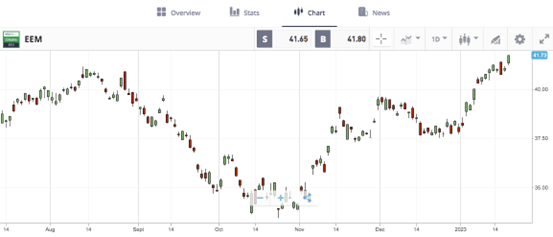
eToro is a multi-asset investment platform. The value of your investments may go up or down. Your capital is at risk.
iShares MSCI India Small-Cap BATS:SMIN (SMIN)
For the more risk-inclined investor, more direct and focused ETFs open the window to greater rewards at the expense of greater risk.
One such holding is SMIN, a basket of small market capitalisation Indian stocks that will benefit from India’s new positioning on the world stage.
Higher by 2% this year, the improved outlook for the Indian economy is benefiting these companies. Some market observers and economists are projecting GDP growth of 7% this year for India’s economy, so there might be room left to run for this ETF.
An added boost via Foreign Direct Investment (FDI) at the expense of China in recent months will also provide a groundswell to Indian companies.
Investing in a single basket of stocks in an emerging country comes with a specific set of risks that the investor needs to consider before embarking on that trade. These include but are not limited to the following:
- Country-Specific Risk: investing in a single emerging market country exposes investors to country-specific risks such as political instability, currency fluctuations, and economic downturns. These risks can significantly impact the performance of the stocks in the basket and can lead to substantial losses for investors.
- Sector Concentration: investing in a single country may also lead to sector concentration risk, where the basket of stocks is heavily weighted towards a specific sector such as energy or financials. This can result in the basket being more sensitive to changes in that particular sector, leading to higher volatility and greater potential for loss.
- Lack of Diversification: a basket of stocks from a single emerging market country may lack the diversification benefits of a more broadly-based emerging markets ETF or index fund, which can spread risk across multiple countries and sectors.
- Lack of Transparency: emerging market countries may not have the same level of transparency and disclosure as developed market countries. That can make it harder for investors to assess the fundamentals of the companies in the basket and make informed investment decisions.
- Limited Liquidity: some of the stocks in a single emerging market country may be harder to trade and may have lower liquidity than stocks in developed markets. This can make it more difficult for investors to enter or exit positions.
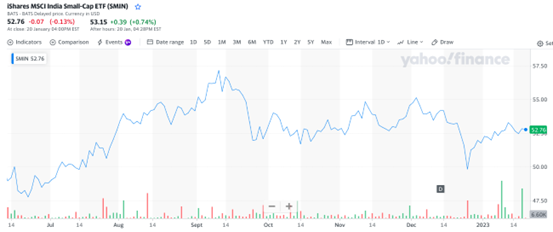
eToro is a multi-asset investment platform. The value of your investments may go up or down. Your capital is at risk.
Emerging Markets Move Differently
Emerging markets are an enormous investment field. If you are looking for a sharper turnaround on capital appreciation and have a higher tolerance for risk, investment directly into individual emerging markets currencies are also possible.
Emerging markets stocks could offer higher returns over the long term but come with periods of significant downturns relative to their peers in developed markets. They can form an integral part of a diversified portfolio and are always worth considering, but you should be aware of the risks before you embark on your EM trading journey.
It is worth keeping in mind that corporate governance and financial transparency in emerging markets can be weaker than developed markets. In some cases, companies may not be subject to the same level of regulatory scrutiny or may have different accounting standards. This makes it more challenging for investors to assess the true value or risk of an emerging market stock.
Many emerging economies rely heavily on exports of commodities like oil, metals, and agricultural products. A slowdown in global demand, particularly from major economies like the U.S. or China, can have a disproportionately large impact on these stocks.
Always do your due diligence and consult with experts to get the best advice.













